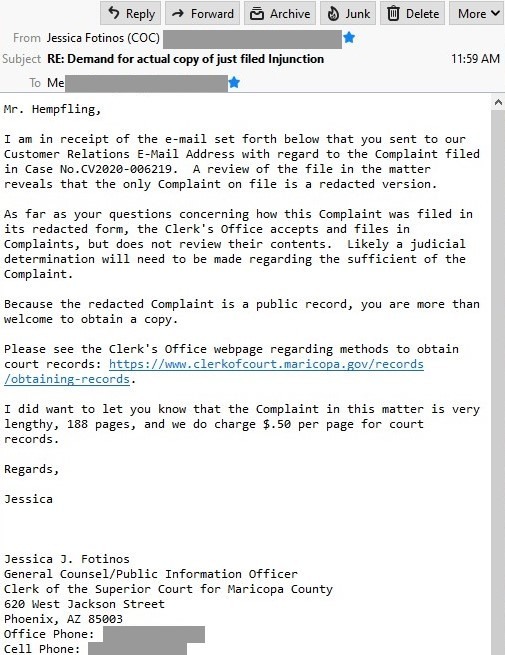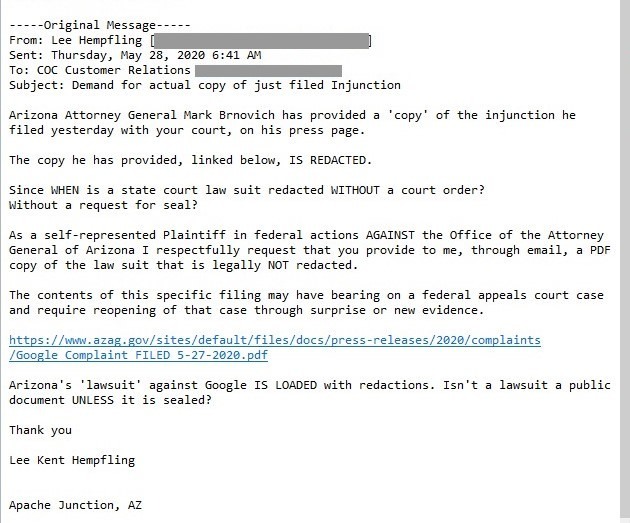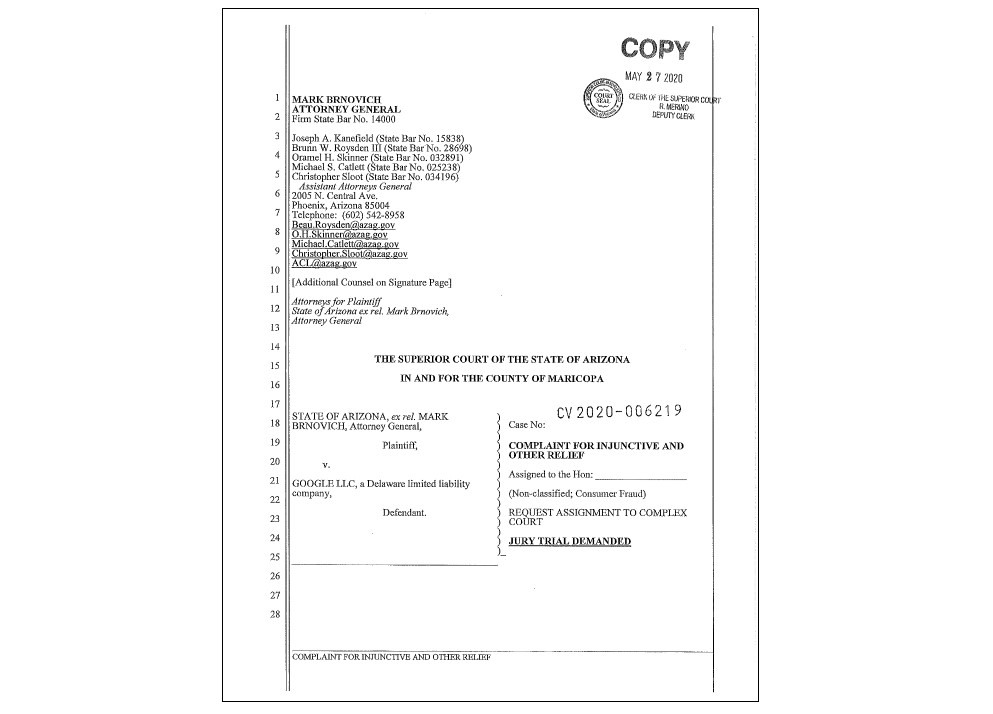The law suit shown below is a PDF is in its entirety. No changes have been made to the document filed with the Arizona State Superior Court of Maricopa County. And as confirmed by Jessica J. Fotinos, the General Counsel for the Public Information Officer of the Clerk of the Superior Court for Maricopa County: this letter response received June 1, 2020 explains a great deal about this fictitious, frivolous and perhaps illegal court filing and that the document was submitted to the Court as a filing COMPLETELY REDACTED. Completely Redacted. Redacted. A public filing has non sensitive, public information allegations and apparently so-called evidence, not only hidden from you, from the press but HIDDEN FROM THE COURT ITSELF.

Mr. Hempfling,I am in receipt of the e-mail set forth below that you sent to our Customer Relations E-Mail Address with regard to the Complaint filed in Case No.CV2020-006219. A review of the file in the matter reveals that the only Complaint on file is a redacted version.
As far as your questions concerning how this Complaint was filed in its redacted form, the Clerk’s Office accepts and files in Complaints, but does not review their contents. Likely a judicial determination will need to be made regarding the sufficient of the Complaint.
Because the redacted Complaint is a public record, you are more than welcome to obtain a copy.
Please see the Clerk’s Office webpage regarding methods to obtain court records: https://www.clerkofcourt.maricopa.gov/records/obtaining-records.
I did want to let you know that the Complaint in this matter is very lengthy, 188 pages, and we do charge $.50 per page for court records.
Regards,
JessicaJessica J. Fotinos
General Counsel/Public Information Officer
Clerk of the Superior Court for Maricopa County
620 West Jackson Street
Phoenix, AZ 85003
The original letter questioned this:

Subject: Demand for actual copy of just filed Injunction
Arizona Attorney General Mark Brnovich has provided a ‘copy’ of the injunction he filed yesterday with your court, on his press page.
The copy he has provided, linked below, IS REDACTED.
Since WHEN is a state court law suit redacted WITHOUT a court order?
Without a request for seal?
As a self-represented Plaintiff in federal actions AGAINST the Office of the Attorney General of Arizona I respectfully request that you provide to me, through email, a PDF copy of the law suit that is legally NOT redacted.
The contents of this specific filing may have bearing on a federal appeals court case and require reopening of that case through surprise or new evidence.[Link below]
Arizona’s ‘lawsuit’ against Google IS LOADED with redactions. Isn’t a lawsuit a public document UNLESS it is sealed?Thank you
Lee Kent Hempfling
Apache Junction, AZ
Then, this morning visits happened:

The injunction is available directly at this address: https://www.azag.gov/sites/default/files/docs/press-releases/2020/complaints/Google_Complaint_FILED_5-27-2020.pdf and directly shown below. Review the entire document in light of the rules.
THE RULES:
16 A.R.S. Rules of Civil Procedure, Rule 3. Commencing an Action: A civil action is commenced by filing a complaint with the court.
16 A.R.S. Rules of Civil Procedure, Rule 5.1:
(e) Sensitive Data.
(1) Generally. A person must refrain from including the following sensitive data in any document the person files with the court, whether filed electronically or in paper, unless otherwise ordered by the court or as prescribed by law:
(A) Social Security Numbers. If an individual’s social security number must be included in a document, only the last 4 digits of that number may be used.
(B) Financial Account Numbers. If financial account numbers are relevant or set forth in a document, only the last 4 digits of these numbers may be used.
(2) Responsibility with Filer. The responsibility for not including or redacting sensitive data rests solely with the person making a filing with the court. The clerk and the court are not required to review documents for compliance with this rule, or to seal or redact documents that contain sensitive data.
(3) Request for Relief. If a document is subject to availability by remote electronic access under Arizona Supreme Court Rule 123, any party or the party’s attorney may ask the court to order, or the court may order on its own, that the document be sealed and/or replaced with an identical document with the sensitive data redacted or removed.
(4) Sanctions. If this rule is violated, the court may impose sanctions against the responsible counsel or party to ensure future compliance.
There is NO request to seal and NO proper procedure filed to hide data from public view. Likewise an original proceeding is not intended to provide such detail that would require redaction.
16 A.R.S. Rules of Civil Procedure, Rule 8 General Rules of Pleading:
(a) Claim for Relief. A pleading that states a claim for relief must contain:
(1) a short and plain statement of the grounds for the court’s jurisdiction, unless the court already has jurisdiction and the claim needs no new jurisdictional support;
(2) a short and plain statement of the claim showing that the pleader is entitled to relief; and
(3) a demand for the relief sought, which may include relief in the alternative or different types of relief.
“I did want to let you know that the Complaint in this matter is very lengthy, 188 pages…”
188 pages long violates Rule 8. The copy provided below consists only of what appears to be the first 48 pages of the filing. Taken from the Ariziona AG’s website, the document is fully redacted and according to the General Counsel for the Public Information Officer of the Clerk of the Superior Court for Maricopa County the ENTIRE DOCUMENT IS REDACTED. Nothing short or plain is in the press release filed with the court. There are no short and plain statements showing anything. There are long winded set ups with the facts hidden from view. A publicly traded company GOOGLE LLC cannot have facts hidden from view in a public court! Without a JUDGE saying so. I fully expect this to be tossed out. But it will have served its purpose. (See below.)
Keep the following sentence in mind while reading this rule. “Likely a judicial determination will need to be made regarding the sufficient of the Complaint.” In other words: THERE IS NO COURT ORDER EXISTING GRANTING A SEAL OF ANY PART OF THIS INJUNCTION. That makes the filing ILLEGAL! Without a court’s determination IN ADVANCE!
(1) “document” means any filing, exhibit, record, or other documentary material to be filed or lodged with the court;
(2) “case-initiating document” means the complaint or other document that a party files with the court to commence a civil action;
(3) “lodged document” means a document that is temporarily deposited with the court but is not filed or made available for public access;
(4) “public access” means the inspection or copying of a document by a member of the public; and
(5) “sealed document” means a document filed or lodged with the court for which public access is prohibited by statute, rule, or court order.
(c) Order Permitting a Document to Be Filed Under Seal.
(1) Generally. On motion, stipulation or on its own, a court may order a document to be filed under seal if this rule’s requirements are met. Unless the court determines that an entire category or type of document meets this rule’s requirements, a court may not enter an order that gives advance authorization to file such documents under seal.
(2) Requirements. Unless a statute, rule, or prior court order authorizes a document to be filed under seal, a court may order that a document may be filed under seal only if it finds in a written order that:
(A) an overriding interest exists that supports filing the document under seal and overcomes the right of public access to it;
(B) a substantial probability exists that the person seeking to file the document under seal (or another person) would be prejudiced if it is not filed under seal;
(C) the proposed restriction on public access to the document is no greater than necessary to preserve the confidentiality of the information subject to the overriding interest; and
(D) no reasonable, less restrictive alternative exists to preserve the confidentiality of the information subject to the overriding interest.
(3) Order’s Contents.
(A) If All of a Document Is Protected. If the court finds that the requirements for filing a document under seal are met and the entire document meets those requirements, it must order the clerk to file the document under seal.
(B) If Only Part of a Document Is Protected. If the court finds only certain pages or portions of pages of a document contain information that merit being placed under seal, it must order:
(i) the submitting person, if he or she has not already done so, to file a publicly accessible version of the document that redacts only those portions of the document; and
(ii) the clerk to file under seal the unredacted version of the document lodged under Rule 5.4(e).
(C) Advance Authorization. If the court determines that an entire category or type of document meets this rule’s requirements, it may enter an order:
(i) authorizing one or more designated parties or persons to file under seal any document that falls within a designated document category or type; and
(ii) directing the clerk to file under seal any document submitted by a designated party or person if the clerk is presented with a copy of the court’s order.
(4) The Clerk’s Duties.
If the court orders the sealing of a document, the clerk must file the order to seal, file the document under seal as directed in the court’s order, and secure the sealed document from public access. Unless the court orders otherwise, the date of the sealed document’s filing is the date the document was lodged with the clerk. The clerk must maintain the document under seal until further order of the court. Nothing in this rule is intended to affect the clerk’s normal records disposition policy.
THIS SO-CALLED LAWSUIT IS NOTHING BUT AN OFFICIALLY FILED PRESS RELEASE! THE ATTORNEY GENERAL’S OFFICE OF THE STATE OF ARIZONA SHOULD BE HELD ACCOUNTABLE BY SANCTION! Afterall, the Court HAS NOT YET DETERMINED IF THE ACTION IS EVEN VALID.
“Likely a judicial determination will need to be made regarding the sufficient of the Complaint.“
Now why, one might ask; am I speaking about a lawsuit supposedly filed against GOOGLE LLC? As a victim of GOOGLE LLC in a federal court action (the 9th Circuit Court of Appeals is the main victim of GOOGLE LLC, ALPHABET and the State of Arizona) the data hidden by redaction inside this lawsuit may have bearing on the illegal activities of GOOGLE LLC and THE ARIZONA ATTORNEY GENERAL’S OFFICE’S USE OF GOOGLE TO COMMIT CENSORSHIP. It may be hiding admission. It may be hiding further crimes. Even the court is not permitted to view that information.
Read this ‘lawsuit’ for yourself. Without the data that is redacted IT IS A WORTHLESS, FRIVOLOUS, CONTEMPTIBLE WASTE OF COURT TIME AND EFFORT.
THE REAL PURPOSE:
Actually, THIS LAW-FARE SUIT IS A SEARCH DIVERSION to make sure when you search Mark Brnovich, the Arizona Attorney General’s Office and GOOGLE you will be presented with a plethora of useless press release material disgorged by a blind and obedient press, and not the detail that should have put Mark Brnovich, Kent Volkmer, Michael G. Bailey and Amanda Stanford IN PRISON TWO YEARS AGO! After using GOOGLE ITSELF to hide Hempfling v Volkmer from world wide search by claiming copyright infringement by the 9th Circuit Court of Appeals for a CHILDREN’S BOOK; having Google stop censoring after having been caught doing it, now Arizona is trying to hide the case again in a different way.
When the time finally does come where Arizona is forced to divulge the actual original content of this worthless filing, which one will they unveil? The actual law suit in whatever form they have collectively decided to make it look like, (Brnovich is married to Federal Judge Susan Brnovich and Michael G. Bailey is married to Arizona Appeals Court Justice Cynthia Bailey) or… the document filled with quotes from the children’s book that was used to censor THE UNITED STATES OF AMERICA?
